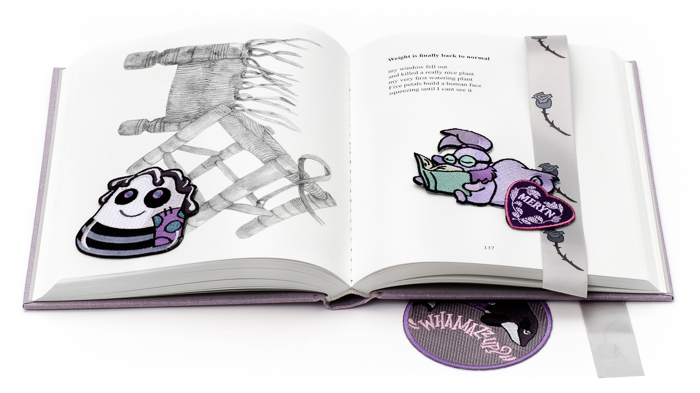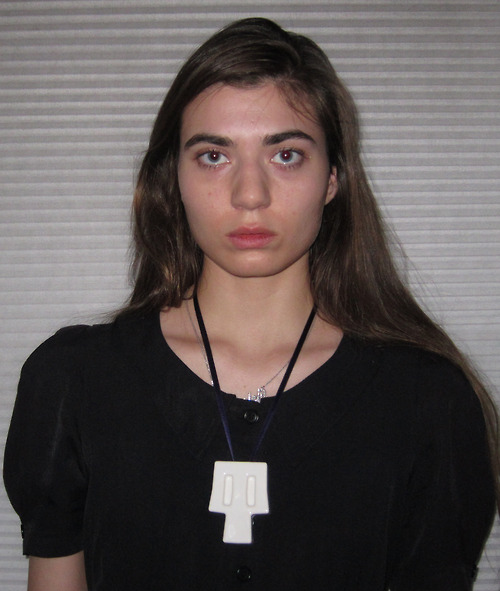
All men are cops
cuff me Im guilty
cuff me Im guilty
cuff me Im guilty
Cunny Poem Vol. 1 is an archive, a complete archive, of Bunny Rogers’ poems posted on her tumblr Cunny Poem. As an artist, Rogers’ work focuses on the multiplicity of meaning inherent in objects such as ribbon, blankets, flowers (see her interview with Harry Burke in the latest issue of Mousse Magazine). This sentiment can be felt as well in her newest project. We can look at the book as an object. It is comprehensive. The rose ribbon, speaks to the cover, speaks to the badges, speaks to the dried flowers, speaks to the words inside. Brigid Mason’s illustrations are as haunting as they are beautiful, a horse minus a hoof, a riveting world of eyes and postures. The book becomes multi-dimensional in an extraordinary way, leading us to question what the book can become.
Heidegger states in his essay “Hölderin and the Essence of Poetry” that the crux of the poem lies in the ability of the seemingly trivial to be transformed into the profound. In crude terms, “Poetry looks like a game and yet it is not.” I feel this term can apply to Rogers’ work as an artist and poet. I think what the reference to Heidegger here attempts to say is that the book has a way of inhabiting characters, events and spaces quickly but deftly. The book stands in a world where this sort of thing is possible, and it starts with the voice. The speaker switches from I to you, to “Michael Scofield” to “Kate and Sawyer” without thinking twice and without losing the strength of the poet’s voice. In fact this ability to speak from multiple perspectives is what gives the book such poignancy. “Andrea model,” early on in the book, is a good introduction to this voice:
Andrea has porcelain skin
Andrea is not vegan
Andrea makes difficult work
Andrea writes a lot
Andrea does her homework
Andrea looks young
Andrea is sexually inexperienced
And unaware
Andrea has a fetish for constrictive fabrics
I am perceptive
Everyone is in love with Andrea
Three straight men in our grade
One shop tech
And a handful of L train commuters
Andrea needs love too
Andrea doesn’t deserve to die
Want to start fund to save Andrea
One of the longer poems in the book, its two parts are set off wonderfully, and one can’t help but let out a sly chuckle in the, “I am perceptive.” It seems, throughout the book, that the poet is saying “Hey, I’m here, remember me? I’m writing these poems and you are reading them.” This break, these interjections are constant and dynamic, like in “Poem for Bernadette,” “you can laugh safely because this is what i wanted / Its all tailoring u know that”.
Going along with this idea of “tailoring,” although the book involves this vast web of characters and topics, the poems feel resoundingly comfortable and restrained. There is no need to fill, as it were. The structure is already there, and the knowledge of this fact comes through strong. Poems like “I dreamed that God would be forgiving” do this well:
Together five sisters of addiction grow up the walls
entrusting there is no world
in which paranoia could save the two of us
Threat is infinite and jovial
Courage is a wink and a nod
Your spine is a joke
Your vertebrae are stacked snowballs
That will melt as your joints do every hour
In this cruel, hot world
Where every root vegetable shrinks your dick
Where we wake up and go to work to laugh at your dick

Bunny’s work has no need for skeletons. Rather, it liberates objects that have been cast off as skeletons. The placement of “I dreamed that God” at the end of the collection speaks to this. The idea, I think the word is trust, that a form will arise, is strong, the trust required in putting together a 237-page book of poems. The poems know they will end up being poems. In thinking about possible links within Cunny Poem I am reminded of Stein’s trust of repetition in long poems such as, “Lifting Belly,” “When did I say I thought it. / When you heard it. / Oh yes.” This idea of multiple speakers makes a lot of sense in relation to Cunny. The voice is aware of some other, there are many voices and one doesn’t know who is starting this project, “Oh yes.” The authority of the speaker becomes contentious, who is who? Where do we go from here? Well, anywhere. That sense of freedom is immediately apparent. The speaker is an inherently schizophrenic concept.
The play with voice, the invitation to the reader, “the intercepting of these signs” as Heidegger puts it, is all here. Stein’s interception works through repetition and voice, picking up on a conversational almost flippant tone and transforming it into something remarkable. Cunny Poem picks up on everything it seems. The book seems to leave no stone unturned but yet never feels overbearing in the slightest. There is comfort in the play with gratuitousness, with conversation, with manners:
I can wipe that smirk off my face this instance
Authority I thought was pretend authority is real authority
This is not prison
I am Arrogant
This is not prison
Note: Civil Cover Mechanisms will be publishing a book of Bunny’s poems in the fall titled, “My Apologies Accepted” sans ribbon and badges. The book will include watercolors by artist Brad Phillips.
***
Conor Messinger was born in 1990. His poetry, reviews and translations have appeared in New Pinky, RamonaWeb and Chronos Loves Kairos. He lives in Brooklyn and curates the Hero Systems reading series at Molasses Books. He tweets at @spirallabyrinth, and tumbls here : http://templeofunderdevelopment.tumblr.com.
Tags: Bunny Rogers, Conor Messinger, Cunny Poem Vol. 1, poetry

tl;dr.
short version: bunny rogers has a book made from tumbler posts; i’m attracted to her.
o, c’mon Jereme— didn’t you read the part about Heidegger ?????